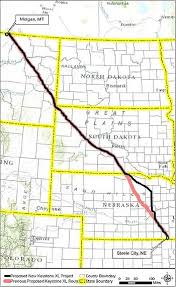
Construction got underway over the weekend in northern Montana on the Keystone XL oil sands pipeline meant to be an extension of an existing Keystone line in Oklahoma and Texas. The extension has been bitterly fought by environmentalists and tribal leaders.
A spokesman for TC Energy said the work started on the $8 billion project at the remote border crossing between Canada and Montana. The Associated Press reported an estimated 100 workers will be involved in the pipeline’s early stages, but that number is expected to swell into the thousands in coming months as work proceeds, according to the company.
The 1,200 mile pipeline was proposed in 2008 and would carry up to 830,000 barrels of crude daily for transfer to refineries and export terminals on the Gulf of Mexico. The first Keystone pipeline was completed in 2014 in Oklahoma and Texas, connecting the oil flow from Cushing, Oklahoma to the Gulf coast refineries. But the Keystone XL is an extension meant to carry even more oil from Canada south to the refineries in Texas.
TC Energy’s surprise March 31 announcement that it intended to start construction came after the provincial government in Alberta invested $1.1 billion to jump start work. Montana’s Department of Environmental Quality on Friday issued the final state permits the company needed, agency spokeswoman Rebecca Harbage said.
Leaders of American Indian tribes and some residents of rural communities along the pipeline route worry that workers could spread the coronavirus. As many as 11 construction camps, some housing up to 1,000 people, were initially planned for the project, although TC Energy says those are under review because of the virus.
TC Energy says it plans to check everyone entering work sites for fever and ensure workers practice social distancing.
Work on the pipeline is allowed under an exemption to Gov. Steve Bullock’s March 26 “stay at home” directive, which is intended to prevent the spread of the virus by discouraging many daily activities, according to state officials. But the directive did not address worker camps.
Bullock is concerned about potential risks from the virus associated with the camps, spokeswoman Marissa Perry said Monday. The Democratic governor “would want those concerns addressed prior to TC Energy and their contractors finalizing their plans of operations for those segments of construction,” she said.
Opponents in January had asked Morris to block any work while the legal challenges are pending. They said clearing and tree felling along the route would destroy bird and wildlife habitat. Native American tribes along the pipeline route have said the pipeline could break and spill oil into waterways like the Missouri River.
For most people, the coronavirus causes mild or moderate symptoms, such as fever and cough, that clear up in two to three weeks. For some, especially older adults and people with existing health problems, it can cause more severe illness, including pneumonia and death.
A hearing on the request to block work is scheduled for April 16 before U.S. District Judge Brian Morris in Great Falls.
Source: Associated Press



